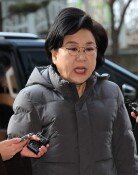No compromise on textbook issue
No compromise on textbook issue
Posted April. 13, 2001 16:15,
The Japanese government is standing firm on its original decision to approve history textbooks that gloss over Japan’s wartime atrocities in spite of strong criticism of its position by the Korean government, which is calling for further revision of the textbooks. Meanwhile, Ryutaro Hashimoto and three other candidates to become the next president of the Liberal Democratic Party declared that there were no serious problems with the textbooks and that Japan should not be influenced by protests from other nations. One of the authors of the controversial textbooks, Prof. Takao Hashimoto, made comments likely to fuel even greater anti-Japanese sentiment here. He said that references to former sex slaves for Japanese soldiers in history textbooks was like writing a history of the arrangement of toilet.
Korean lawmakers paid a visit to Japan and met with its education and science minister Nobutaka Machimura and foreign minister Yohei Kono, both of whom showed no intention of revising the textbooks again. Machimura gave the opinion that he had the authority to recommend additional revision in case clear mistakes were found, but that the situation was quite different this time. Kono also said that he was not considering any such revision. In short, they would not budge.
The reaction of Tokyo is based on the reasoning that the government is in no position to meddle politically in the contents of textbooks as the screening is supposed to adopt a neutral stance. However, the Japanese government cannot shirk responsibility for the distorted contents so long as it is in charge of authorizing them under a system where its education ministry officially approves textbooks. A relaxation of its screening standards served to induce a greater nationalistic slant to historical descriptions. Japan also may think that the Korean and Chinese protests are, in a way, interference in the internal affairs of Japan. But the two neighbors are not taking issue with those parts of the textbooks that deal with what happened to Japanese inside Japan. They are asking for the correction of false accounts of the suffering of victims of Japan`s colonial rule and aggressive wars. This can hardly constitute an act of interfering in the domestic affairs of another people.
Japan is trying to teach falsehoods to its new generations and gloss over its wartime crimes, risking diplomatic friction with its neighbors. It is a dangerous course for Japan to take. The Korean government is correct, albeit belatedly, in deciding to use all means to make Japan change the textbooks. It should not settle for a few cosmetic changes of minor words that Japan might make reluctantly. No compromise ought to be made unless there are fundamental changes in the contents.







